Catching the Cat
When Chris Wells travels to relocate his 87-year-old mother to senior housing he encounters an obstacle that was (literally) unforeseen.
I knew that if Bobby and I could catch my 87-year-old mother’s cat, we’d be able to move my mom out of her house and into the Mayflower Gardens retirement community.
I had never laid eyes on this cat. For years I’d been calling it my mother’s mythical cat. I imagined writing a play about an old woman who lives in a drafty house with her imaginary cat, and her adult son who comes to visit but cannot see the cat.
I should tell you that this story does not contain any symbols, there are no metaphors, no literary devices. I’m just going to tell you what happened when we tried to capture the invisible cat and remove it and my mother from the house where I grew up in Lancaster, California, where everyone goes to see the poppies every spring.
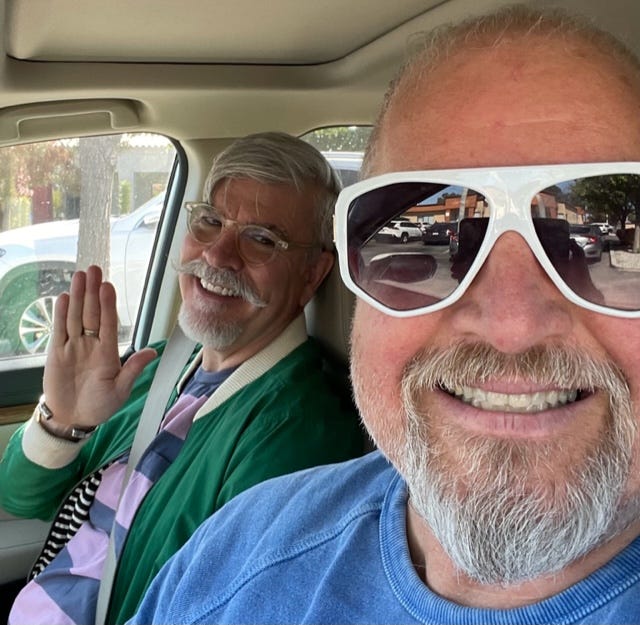

Last November, my husband Bobby and I put everything we own into storage in Woodstock, N.Y., where we’d lived for nine years. Our lease was up and we figured it was a good time to get my mother, Lyn, moved out of her home of fifty-two years. The house is two stories with a pool and a big yard and big utility bills. Not to mention, it’s unsafe for my mom to live alone there. She had already fallen several times.
After packing up, Bobby and I and our little rat terrier, Sally, drove west. I won’t bore you with how many different places we stayed and for how long, but on January 14th, due to my mother’s reluctance to leave her home, Bobby and I moved into Mayflower Gardens ourselves, instead. The new plan was, we’d get the apartment ready for mom while we lived in it, work on the house during the days, and when the time came, switch places with her. Mom would move into the apartment, and Bobby and I would move into the house, do a quick clean up and put the house on the market for her. By spring, we’d surely have the place sold, and be back in Woodstock.
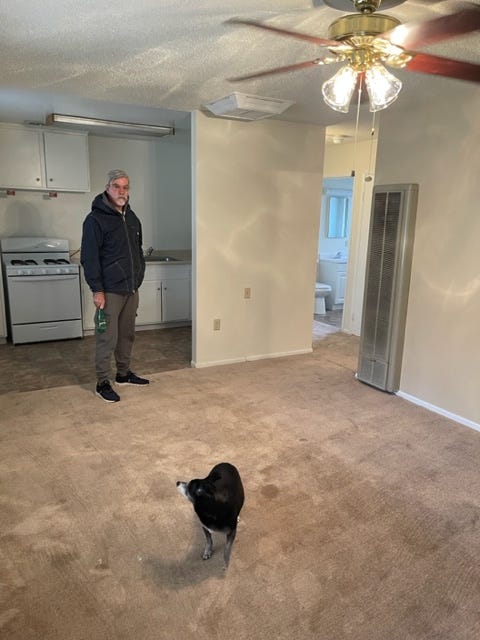
No one at Mayflower Gardens found it ironic when we, two men in our late 50s, moved in. All the old timers we’d meet there would welcome us as if we belonged there—“No,” I always wanted to scream, “I am not that old!” (Sure, sweetie.)
I had never laid eyes on this cat. For years I’d been calling it my mother’s mythical cat.
By the way, I have a pitch for a new TV show, Live from Mayflower Gardens about two late 50something homosexual artists from the big city whose circumstances drive them to move into a retirement community in the Mojave Desert.
Anyway, every morning Bobby would drive ten minutes to my mom’s where he had set up his art studio. I would do my own work at the apartment at Mayflower Gardens. Bobby would come “home” to the apartment for lunch and afterward we’d head back to my mom’s where he’d return to work and my mom and I would return to fighting. Kidding. Sort of. Let’s just say, things were tense.
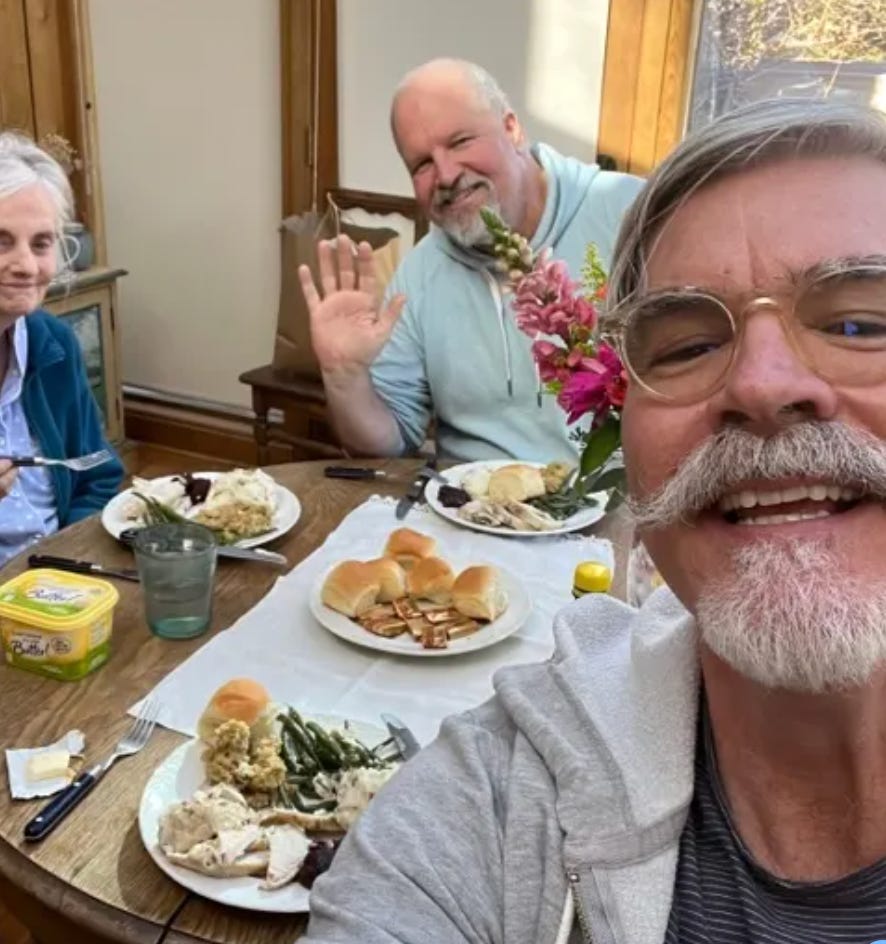
One day she answered the door: “I’m not going out there and neither is my kitty.”
For years, every time we talked on the phone she’d say, “Chris, I have got to sell this house.” She decided Mayflower Gardens was her best option, but as reality approached, she became like James Cagney in White Heat—”Back off, copper, or I’ll spit in your eye.”
Her resistance was understandable. Leaving one’s home, the place of family history, a haven and refuge, is a huge and painful passage for many. But moving her out would mean less danger of injury, and less stress for everyone involved. And selling the place would provide my mother with an income off of which she could live comfortably.
To understand what was about to happen, you need to know that one day, while going through things, my mother gave me my cousin Louie’s Marine issue peacoat. I couldn’t bear to try on the coat, as the house was kept at a steamy 78 degrees and I was in a constant state of heated irritation. I put it with the piles of stuff to keep, donate, or sell.
Due to my mother’s reluctance to leave her home, Bobby and I moved into Mayflower Gardens ourselves, instead. The new plan was, we’d get the apartment ready for mom while we lived in it, work on the house during the days, and when the time came, switch places with her.
As the days passed, we prepared the apartment, and worked on the house. Bobby placed the cat’s crate in my mother’s bedroom.
“Any luck getting the kitty in the cage?” I asked her.
“She doesn’t like the crate.”
Right. No symbols. No metaphors, no literary devices.
How were we going to make this happen? Would Bobby and I enact a scene where we’d pretend to see a cat and pantomime its capture, carefully closing the crate, saying sweet comforting things to the air as we did so? Perhaps I would draw on my improv training from years ago and add some kitty sounds, some scratching.
To pull this off, we’d need sedation. Not for ourselves, no, for the cat. Our dog’s a nervous traveler so on long car rides, we give her half a Valium, as prescribed by her vet. With mom’s invisible kitty, we’d have to guess at the dose. How much valium does it take to calm down a cat that doesn’t exist? We figured a quarter would do the trick.
While Bobby crushed the pill, I spooned some cat food into a bowl. We sprinkled the powder on top and covered it with gravy. I asked mom to call us once the kitty had eaten, and we returned to Mayflower Gardens.
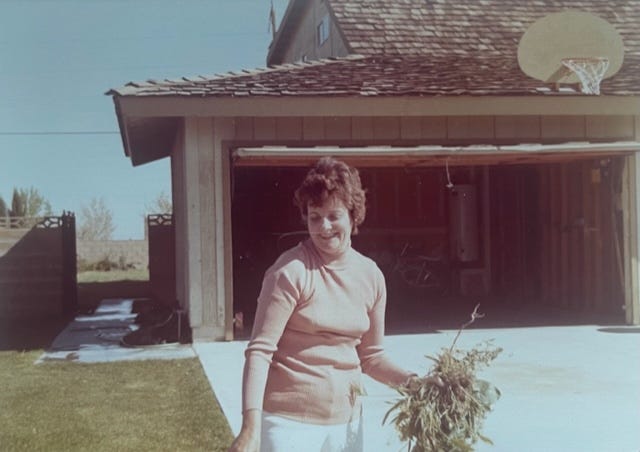
Hours later the phone rang. Mom said the cat had eaten the food but the house was already locked up. Maybe we should aim for the next day?
Right.
The next morning, when he woke up Bobby declared, “We’re going to get that cat today.”
I’d seen this side of my husband before—he identifies a goal, and becomes clear and focused. No doubt or hesitation. Back at my mom’s, we crushed the valium, spooned the cat food. A couple hours later, Bobby said, “Get the peacoat,”—right, I thought, imaginary scratches—and we went upstairs.
What proceeded to happen was one of the stupidest episodes of my entire life, which is saying A LOT. The room was cluttered: furniture, piles of books on the floor. The ceiling had started leaking from the recent storms, so the carpet was smelly. And it was stifling. I ran downstairs to turn down the thermostat which, was set at 80 degrees.
Back upstairs, Bobby was looking under the bed, “I see her.”
OH MY GOD! There was actually a cat! It’s so satisfying when imaginary things become real. Not your nightmares or negative obsessions, but a cat that you suspected your mom was making up for years? Comforting.
Her resistance was understandable. Leaving one’s home, the place of family history, a haven and refuge, is a huge and painful passage for many. But moving her out would mean less danger of injury, and less stress for everyone involved. And selling the place would provide my mother with an income off of which she could live comfortably.
Using the baseball bat my mother kept at her bedside—another story altogether—Bobby gently prodded the kitty. She dashed out from under the bed and into the closet. It was true! A real cat. It was like spotting a leprechaun.
The bedroom also had a space heater keeping things toasty. “Could you turn off the heater?” I barked. My mother scowled, but complied.
Bobby kept prodding. The kitty kept darting about. I kept moving things out of the way, while carrying the crate, like a drunken dog catcher, sweating, increasingly irritated.
“It’s so hot!” I shouted at one point, stumbling toward the window, like a prisoner on death row, desperate for one last gasp of freedom.
“It’s not hot!” My mother screamed back at me, as if I were imagining my own body’s temperature. At that point Bobby decided he needed a blanket.
For the next seventeen hours we crashed about that stifling room, Bobby in the peacoat holding the blanket, me, violently moving things about, my mother standing in the middle of the room, chuckling at her crazy kitty.
At one point I nearly crashed into her.
“Mom! Maybe you should leave the room.”
“Maybe you should leave the room!”
Eventually, after throwing all of my mother’s clothes on the floor and turning the room upside down, we watched my mother walk over to the kitty, lean down and say, “You’re OK kitty, no one’s going to hurt you.”
I wasn’t one-hundred percent on board with that sentiment by that point, but I kept my mouth shut. My mother calmed the kitty down long enough for Bobby to toss the blanket over, bundle it up and put it into the crate. I closed it, walked that crate down to the car, and came back. “OK, let’s go.”
Two mornings later, my husband and I lay on our blow-up mattress in my childhood bedroom. I heard a sliding sound followed by a heavy thud. Sally started barking. I jumped up and ran to my mother’s old room. The ceiling directly over her bed had fallen in.
And like that, we moved my mom into her new apartment. Bobby and I moved into the house.
As Bobby said later, “This thing is just writing itself, isn’t it?”
Um, no. I’m writing it.
Two mornings later, my husband and I lay on our blow-up mattress in my childhood bedroom. I heard a sliding sound followed by a heavy thud. Sally started barking. I jumped up and ran to my mother’s old room. The ceiling directly over her bed had fallen in, large strips of insulation and sheetrock hung down, pieces of wall lay on the mattress, box spring and floor.
Stepping close I saw sky between slats of wood. The roof couldn’t withstand the extreme rains and winds from last winter’s storms and collapsed.
Talk about timing. Thank God my mom wasn’t in bed when it happened!
So now my husband and I are living in the house where I grew up, fixing up the place. Whenever I drive to Mayflower Gardens, when my mother opens the door, she seems slightly more at peace. She still can’t admit the move was a good idea. But yesterday, taking her to get groceries, she said, “My kitty started jumping on the bed, I think she’s happy.”
No symbols, no metaphors, no literary devices.





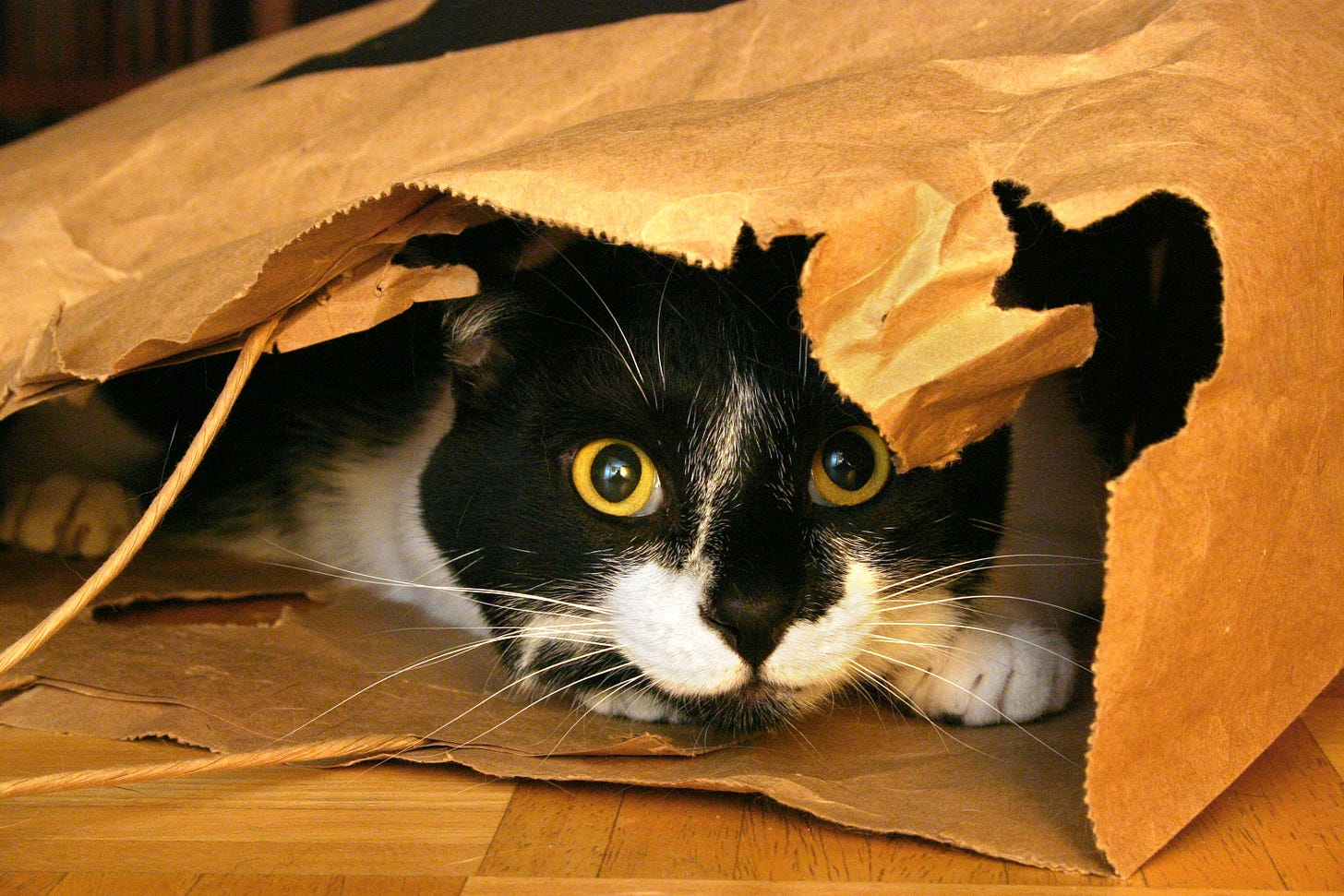
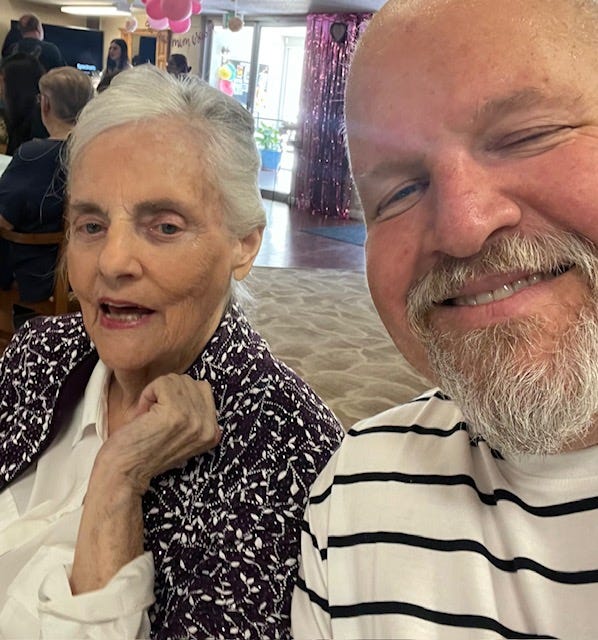
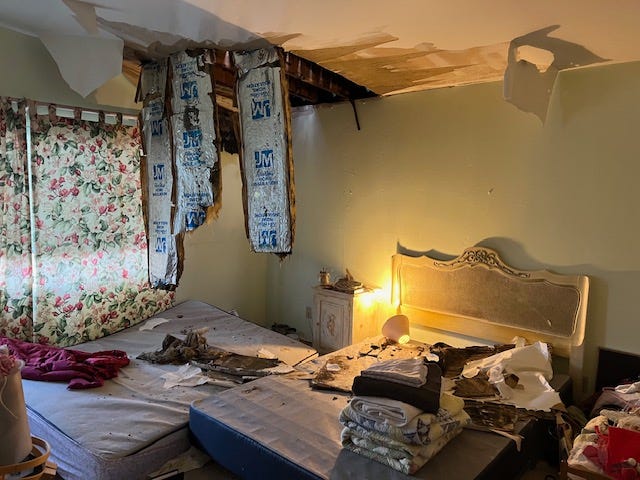

That was one of the funniest things I've read in forever. No metaphors, no literary devices...
Oh, Chris .... I laughed until I cried. And your husband said it all: "This thing is just writing itself." MARVELOUS!